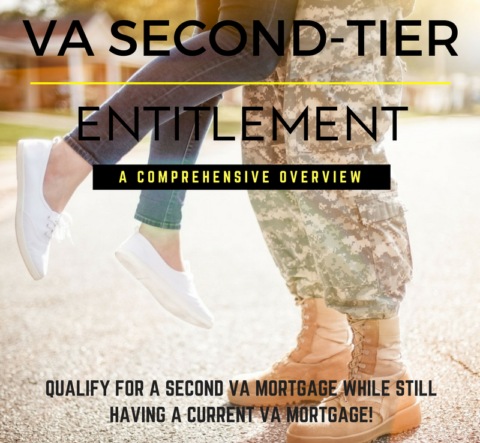VA Loan Credit Issues
VA will analyze a borrower’s past credit performance in determining the loan for approval. A borrower who has made timely payments for the last 12 months serves as a guide and demonstrates their willingness to repay future credit obligations. On the opposite side, a borrower who reflects continuous slow payments, judgments and delinquent accounts is not a good candidate for loan approval.
Below is a list of items concerning the borrower’s credit:
LATE MORTGAGE PAYMENTS
In circumstances not involving bankruptcy, satisfactory credit is generally considered to be reestablished after the veteran, or veteran and spouse, have made satisfactory payments for 12 months after the date of the last derogatory credit item(s).
When the underwriter analyzes the borrowers credit; it is the overall pattern of credit behavior that must be reviewed, rather than isolated cases of slow payments. A period of financial difficulty does not disqualify the borrower if a good payment pattern has been maintained since then.
Account balances reduced to judgment by a court must either be paid in full or subject to a repayment plan with a history of timely payments.
NO CREDIT HISTORY
In the area of credit, the lack of an established credit history should not be a deterrent to loan approval. As provided in the credit standards, a satisfactory payment history on items such as rent, utilities, phone bills, etc., may be used to establish a satisfactory credit history.
CHAPTER 7 BANKRUPTCY
The Kentucky VA guidelines state that a minimum of two years must elapse since the discharge date of the borrower and / or spouse’s Chapter 7 bankruptcy, not the filing date. A full explanation of the bankruptcy will be required. The borrower must also have re-established good credit, qualify financially and have good job stability.
CHAPTER 13 BANKRUPTCY
The Kentucky VA guidelines state that they will consider a borrower still paying on a Chapter 13 Bankruptcy if the payments to the court have been satisfactorily made and verified for a period of one year. In addition, the court trustee will need to give written approval to proceed. A full explanation of the bankruptcy will be required. The borrower must also have re-established good credit, qualify financially and have good job stability.
COLLECTIONS, JUDGEMENTS AND FEDERAL DEBTS
The Kentucky VA guidelines state that if a collection is minor in nature, it usually does not need to be paid off as a condition for loan approval. Judgments must be paid in full prior to closing. A borrower is not eligible for the loan if they are delinquent on any federal debt. This can include tax liens, student loans, etc. Payment arrangements that would bring the borrower up to date may be considered for loan approval.
FORECLOSURE
A borrower whose previous residence or other real property was foreclosed on or given a deed-in-lieu of foreclosure within the previous two years since the disposition date is generally not eligible for a VA insured mortgage. If the foreclosure was on a Kentucky VA loan, the applicant may not have full entitlement available for the new loan.
In order to verify your credit history, your lender will obtain a credit report containing
information as reported by all 3 of the major credit bureaus: Trans Union, Equifax and Experian.
Most people will have 3 credit scores but it is possible that you may have only 1 or two scores if
you have limited credit history.
This report will also include information on any public records such as bankruptcies,
judgments and tax liens.
Credit Scores
Though VA does not have a set minimum credit score requirements, lenders will have a minimum credit
score requirement.
Collection account may need to be paid off in order to close your loan
It is preferable that the most recent 12 months show satisfactory payments and no other derogatory
information.
Credit History
If you experienced a major derogatory credit event, there will be waiting periods that will have to
be observed before you can be eligible to qualify for a loan.
Bankruptcy Chapter 7
2 years from discharge date
Bankruptcy Chapter 13
Immediately after discharge or
After 12 months of payments***
Foreclosure*
2 years from completion date
* If the foreclosure or short sale was on a VA loan, you may not have full entitlement available
for the new loan
*** Must obtain written permission from the bankruptcy court/trustee and provide proof of
satisfactory payment history
Income and Employment
Minimum History of Employment
A minimum of 2 year history in the same industry/line of work is required in most instances but
it’s not a universal rule.
Recent graduates can satisfy the two year requirement by providing proof of schooling with a degree
for the line of work you are now
employed in.
Active duty members do not need a two year history as long as the minimum service requirement for
eligibility has been met.
Self employed borrowers must always have a two year history of self employment and must show a two year history of filed tax returns to meet the 24 month requirement.
Income Calculations
If you are salaried, your base income will be used to qualify you for the loan.
However, if you are an hourly employee with varied hours, more than likely, your income will be
averaged over an extended period such as 18 or 24 months depending on the situation.
Overtime, bonuses, commission and part time employment must have a 24 history in order to be
included in the qualifying income.
The income will be averaged out over 24 months. Verification of
likelihood to continue will also be required.
Non taxable income can be grossed up to account for the non-taxable status.
Retirement, Disability, alimony and child support income does not require a 2 year history but
verification that it will continue for at least 3 years is required in order for it to be included.
No down payment does not mean no cash needed
VA does not require additional cash to cover a certain number or mortgage payments or unplanned
expenses (cash reserves), however, your ability to accumulate liquid assets and the amount of
assets currently available is taken into consideration in the overall credit worthiness analysis.
Allowable source of funds
Funds for your down payment, closing costs and other expenses can come from:
• Checking/savings accounts
• Investment accounts
• Retirement account
Gift funds from a relative are an allowed source of funds to cover down payment and or closing
costs.
The gift will need to be verified and paper trailed via bank statements and a gift letter will need
to be signed
by your and the gift donor .
Funds from unsecured loans (signature loans, credit card advances) or funds that can not be
documented are not acceptable source of funds.
Federal regulations require that all deposits into your account be documented.
In the instance of payroll deposits, nothing will need to be done if the deposit shows as a Direct
Deposit from your employer.
All other deposits will need to be explained and documented.
A debt to income ratios
-A debt to income ratios is the percentage of your total debt obligation, including the new estimatedmortgage payment, all debts shown on your credit report, as well as alimony, child support etc, as
compared to your gross qualifying income.
EXAMPLE
The rule of thumb is that your debt to income ratio should not exceed 50% of the usable, gross monthly
income. However, higher percentages can be approved.
In addition to the debt to income ratio requirements, VA also has residual income requirements. VA residual
income looks at how much income is available after all monthly liabilities, including tax withholdings,
utilities and child care, are accounted for.
Residual Income By Region
For loan amounts of $80,000 and above
Family
Size
Northeast Midwest South West
1 $450 $441 $441 $491
2 $755 $738 $738 $823
3 $909 $889 $889 $990
4 $1025 $1033 $1033 $1117
5 $1062 $1039 $1039 $1158
over 5 Add $80 for each additional member up to a family of
seven
2400/5000= 48%
Deferred student loans
If student loan repayments are scheduled to
begin within 12 months of the date of loan
closing, the anticipated monthly payment will
be included.
If you are able to provide evidence that the
loan(s) will be deferred for a period outside
that time frame, the payment will not be
included.
Qualifying income: $5000
New mortgage payment: $2000
All other obligations: $400
Monthly debt payments
The payments shown on
your credit report will be
used to qualify you. If the
payments are incorrect,
you will be asked to
provide proof of the correct
payment.
Co-signed loans
If you co-signed for someone on a loan and
that loan is showing on your credit report, the
payment will be included in the ratios unless
you are able to provide evidence that the other
person on that loan has been making the
monthly payments from an account that you
are NOT a co-owner on.
Alimony/child support
You will be expected to
truthfully declare that
you pay alimony or child
support. You will be asked
to provide your divorce
decree and/or child support
order to verify the amounts.
Non-purchasing spouse
You should be aware that if you purchasing a home
in a community property state such as California
and are married, your spouse’s credit report will be
required. His/her debts will be included in the ratio
calculations even if he/she is not going to be on the
purchase or loan.
Home
Documentation Checklist
Joel Lobb
Mortgage Loan Officer
Individual NMLS ID #57916
American Mortgage Solutions, Inc.
Text/call: 502-905-3708










